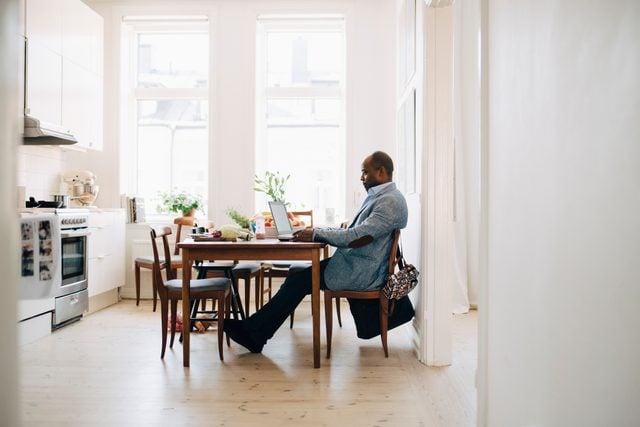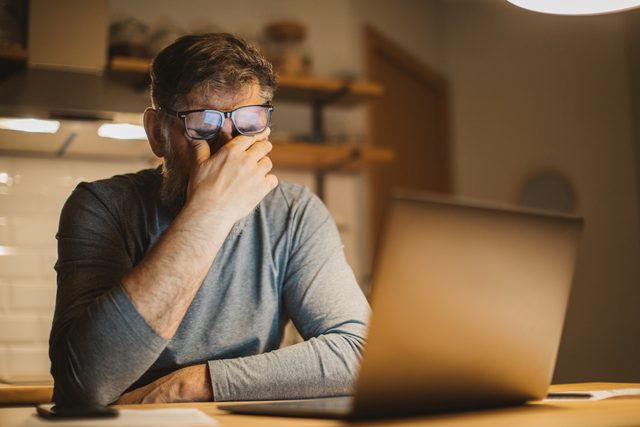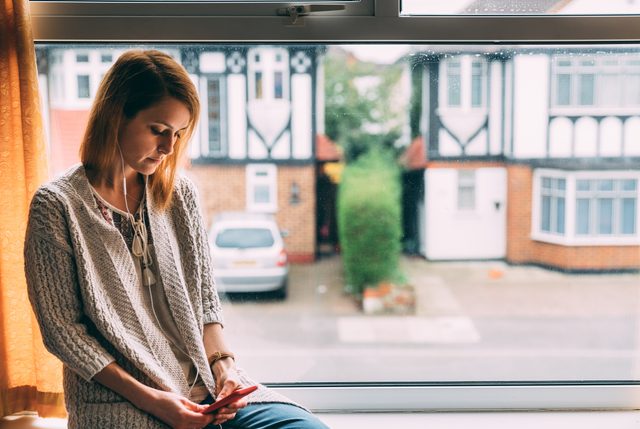Coronavirus Quarantine: Why Am I So Mentally Exhausted?
Updated: Mar. 30, 2022
Mental health experts explain why you feel mentally exhausted during Covid-19, including stress and anxiety, and offer their tips for coping.
Wherever you are—in coronavirus lockdown at home or masked and gloved at your essential job— life has changed dramatically in the last month. Maybe you’re juggling childcare and remote work. Or perhaps you’re drained by anxieties about flattening the curve, consumed with precautions to keep yourself and others from getting sick. (Follow these tips for coping with coronavirus-related stress and anxiety.)
Is it any wonder you feel mentally exhausted?
If your energy has dwindled along with your social calendar, you are not alone. A Kaiser Family Foundation (KFF) poll conducted in the last week of March revealed that 45 percent of respondents say coronavirus has negatively impacted their mental health.
Remember, your mind is adjusting to a brand-new threat, says Janet Civitelli, psychologist and certified career coach at Vocation Village, a company that focuses on career coaching and counseling. “Covid-19 is attacking on all levels at once, and this type of stress is extremely draining.”
There is no need to feel bad or ashamed if the stress feels insurmountable some days. Many people report feeling “fogginess, haziness, anxiety or numbness” in the face of this pandemic, says Katie Heeran, licensed marriage and family therapist, and also founder of Strategic-Intuitive Life Coach, a company that allows her to coach clients around the world.
Joanell Serra, licensed private marriage and family therapist in Belvedere Tiburon, California, adds that anxiety and depression also contribute to feeling mentally drained. “Depression causes fatigue, and anxiety disrupts sleep, which increases exhaustion during the day,” she says. (Check out these 13 tips to deal with depression during quarantine.)
Your mental fatigue could stem from several factors, from financial stress or health anxieties to remote work adjustments or tensions with family members in a crowded house. It helps to identify which stressors are draining your energy, then take concrete steps to alleviate the problem. (Here’s how to overcome an existential crisis.)

Work from home adjustments
As stay-at-home orders have spread from state to state, companies have scrambled to set up new remote work capabilities. Maybe that has resulted in morning Zoom calls interrupted by your toddler asking for a glass of milk. Or maybe you’ve realized your home internet connection can’t handle downloading critical work files. Even people accustomed to flexible work arrangements might struggle with work-life boundaries during the upheaval of a pandemic, Civitelli says.
“Offices are generally set up for focus—ideally everything from ergonomics to availability to grab lunches to go back to work. And not having children there!” Serra adds. “Take all these people and have them in their houses, and it’s an uphill battle trying to be productive,” she explains.
Solution: First, it’s important for you to know your rights. If you are burning the candle at both ends because your children’s school was canceled due to Covid-19, check to see if you are eligible for extra paid time off under the Families First Coronavirus Response Act. Utilizing additional sick days could alleviate mental fatigue by giving you a chance to catch your breath. Also, learn how to breathe healthy.
Serra says it’s also important to divvy up household responsibilities and schedule with other adults in the house. “Have a more formal discussion with the people you live with. Communication has never been quite so important within households.”
Fear of financial loss
Even back in 2015, the American Psychological Association’s Stress in America survey report found money and finances has always been a top stressor despite the state of the economy. The APA has found this to be true since they started doing the survey in 2007. Now, this everyday fear has become a devastating reality in the time of Covid-19.
According to the U.S. Department of Labor, 22 million Americans filed for unemployment benefits in the last four weeks. If you have not lost your job, chances are you know someone who has. Fear of losing your job, anxieties over investments, and looming unpaid bills can all steal precious mental energy.
Solution: Sometimes knowledge really is power. Gathering your financial information and making a budget—a careful plan for maintaining a healthy lifestyle even if money gets tight—can be an empowering way to bring yourself out of a mental spiral. Civitelli recommends being proactive if you are already in financial need. She says, “Pursue all avenues of help whether offered by the government, community resources, friends, or family.” Find out what else you can do to prepare for a coronavirus winter.

Social media overload
It might be tempting to constantly scroll for breaking news, but this quest for answers could backfire. If you constantly check your newsfeed, you need to decide what information is actually helpful and what could trigger your anxiety. Turning off your device could help, but it can be difficult during this time.
Texting and phone calls help people stay connected to isolated loved ones during quarantine. But remember, it’s possible to strike a balance when it comes to using your phone and social media consumption. Try to use your phone or computer to soothe your mind instead of depleting your energy. (These are the 10 hidden effects of social media on your brain.)
Solution: Serra says, “It’s important to notice the difference between going to a community experience online versus random scrolling, which can make anxiety worse.” She recommends planning online “touchpoints,” group experiences with people you normally interact with in person. Suggestions include a virtual family trivia night, joining an online book club, or setting up a group call with friends or family as you cook dinner together in your own homes.
Civitelli adds that you should find a virtual hangout or social media group that fits your personality. What rejuvenates one person might deplete someone else. Once you’ve discovered an online social activity you enjoy, she suggests scheduling a social connection several times per week.
Fear of getting coronavirus
Civitelli suggests part of our fear of the virus is fear of the unknown. She explains, “Many of us are afraid of Covid-19 because we aren’t sure if we will catch it—and if we do, whether we will survive.” (Here are 9 coronavirus myths you should stop believing.)
While you can follow the Centers for Disease Control and Prevention’s guidelines by scrubbing your hands and covering your face, it’s nearly impossible to know if and when you have been exposed to the virus. Serra notes that your inner fear of the virus and outer compulsion to keep your home sanitized can lead to mental exhaustion. “With this level of fear of germs, people feel like they can’t just tidy up. They need to scrub,” she says. (Find out how long hand sanitizer really lasts.)
Solution: Because 24/7 fear of an invisible enemy is incredibly draining, Heeran recommends focusing on what you can control, such as a cleaning regimen. She says, “Develop a routine that includes doing everything in your power to stay virus-free. Those action steps can give us a sense of knowing we are doing what we can in such an uncertain time.”
Both Civitelli and Serra emphasize how exercise refills depleted energy while also improving your health. This is a proactive step in the face of a health crisis. Civitelli says, “There is some research that exercise that is too intense affects the immune system in ways that make people more vulnerable to Covid-19, so keep it light or moderate.”
Being with family 24/7
“Interpersonal relationships are causing conflict because we are all stuck inside with each other for an unusually long period of time,” Civitelli says. While you might have started the year with plans to spend more time with your family, quarantining during a pandemic probably isn’t what you had in mind. It can be difficult to find personal space or moments of peace, particularly for parents of small children.
Partners quarantined together might also feel mentally depleted if they rely only on each other for conversation and mental stimulation.
Solution: Heeran suggests staying in touch with people outside your household, whether that means reaching out to friends or joining a structured online support group.
Get the most benefit from outside support by identifying the most positive, uplifting people in your circle, advises Serra. If your marriage or domestic partnership is really suffering, she says, “you need to surround yourself with people who believe in your relationship… Moving out isn’t generally an option for now.” However, you may need to leave in cases of domestic abuse; make sure you can recognize the signs and don’t hesitate to get help if necessary: Contact the National Domestic Violence Hotline: 1-800-799-SAFE (7233). You may also want to keep numbers for local safe shelters handy.
Civitelli says that no matter who you are stuck in the house with, “Find a way to give each other some space, even if you just take turns visiting the balcony or backyard.”

Worry about distant family members
As Covid-19 spreads across the country, it is natural to think about family and friends who live far away. Are they healthy? Are they following all the guidelines? Civitelli says, “People are fighting with family members about the ‘right’ ways to stay safe.”
Remember, there is nothing you can do to control the habits of other people. And constant worry over something you can’t control is exhausting. Take note if your mental fatigue stems from worry over factors outside your circle of influence.
Solution: Serra says that now is a critical time for communication. It’s easy to assume that means constant, clear communication with others in your household, but it also applies to your loved ones far away. If you’re still feeling anxious after checking in with friends and family in other places, remind yourself that they have access to the same online resources—support groups, telemedicine, virtual therapy—that you do.
Uncertainty about the future
Heeran says one of her clients’ most common reasons for mental exhaustion is worry about the future. It’s natural to be concerned about the upcoming weeks and months, but we ultimately have no control over when quarantine ends. Serra says not knowing how long quarantine will last is particularly concerning for anyone dealing with anxiety or depression. She says, “One of the biggest enemies of mental health is isolation.”
Solution: Though physical activity does not directly relate to what happens next month or even tomorrow, it can have a wonderfully grounding effect. Serra says, “Physically moving will help anxiety and depression. And it will help you sleep.” She recommends any movement that brings you joy and takes your mind away from your fears—dancing around the living room, taking a walk, finding an online workout class, or using your home gym.
Heeran agrees, “Getting into the body is one of the best ways to calm the mind. Make sure you’re moving every day right now as our overall physical activity is down. This will help.” Here are 10 online fitness classes to try right now.
Do you have a story to share about coronavirus? Click this link to share your Covid-19 story with us.














